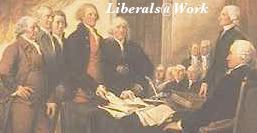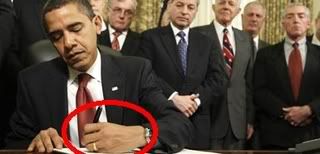John Cole asks a thought provoking question:
When things were "only" as bad as they are today, there was still a lot of political posturing and the usual nonsense. By the time FDR was sworn in, things were much worse than now -- primarily due to an administration that took the political/ideological games seriously and was on the wrong side of the argument while the nation sank into despair for over three years. If we had another 2-3 years of George W. Bush doing nothing to look forward to, there would barely be a country to hand off to Barack Obama. That's was Hoover's gift to Franklin Roosevelt.
Historical parallels are never exact, but often instructive. Consulting my handy 6 volume collection by James Truslow Adams, The March Of Democracy, at least this contemporary historian notes no significant obstructionists to FDR's initiatives at the beginning of his presidency. The attitude of the population had undergone a remarkable transformation between the Crash and FDR assuming office and Congress reflected that change. From Adams, Vol. IV, Pg. 338:
Institutions familiar even now like National City Bank of New York and Chase National Bank were found to be scandalously mismanaged by their front offices, leading to "collosal losses" just coming to light at the beginning of 1933. Back then, there was no New Deal era device to protect depositers like the FDIC. The panic was real, the losses palpable and real hysteria did not need to be pumped up by bloviating pundits and Congressional leaders for political exploitation.
FDR's Cabinet was approved without committee hearings by 6:00 pm on Inauguration Day, March 4, 1933, including Cordell Hull, the first southerner serving as Secretary of State since John C. Calhoun in 1845, and the first woman Cabinet official, Frances Perkins, Secretary of Labor. Less than a week later, during a special session after only 40 minutes of "debate" the House passed by acclimation the President's banking initiatives, conferring peace-time financial regulation authority previously only considered legal under war conditions through the Trading with the Enemies Act. The measure passed the Senate 73-7 after considering the act only three hours.
This was more than a mere reflection of the Democratic Party's gains from the election four months earlier. There was a new psychology at work, an acknowlegement that something, anything must be done -- and done right then and there. Yes there were substantial critics, vocal groups and editors who fought FDR every step as the commentors at Balloon Juice point out -- Father Caughlin and the Liberty League for example -- but no truely effective opposition on Capitol Hill at that point.
This was a stark reversal of the previous years' political battles. In 1932, "The debates over the problem of meeting the hitherto unheard-of deficit in the Treasury by taxation became so wild and acrimonious that Congress had to be adjourned for tempes to cool and reason to reassert itself." While electorally, we are now in the post-inauguration after-glow/honeymoon period -- the carnival and trade-show atmosphere at CPAC notwithstanding -- economically it's 1930, and hopefully we can steer a different course than Hoover.
In a way, we should point to the nonesense from Republicans like Boehner, Cantor, and, Jindal as a healthy sign. If things were really as bad as they were when FDR took over, they would have already shut their yap.

You know, I keep wondering- was the opposition party this petty and stupid during the great depression? When FDR proposed his budget, did some rich prick with a fake tan get up in front of microphones an hour after it was proposed (mind you, this is the same guy who whinged he did not have enough time to read the stimulus bill after a month, but an hour was sufficient time to read the budget), and say “OH MY GOD THE ERA OF BIG GOVERNMENT IS BACK!” Was there a John Boehner of that time period? And this is a serious question- was our politics always this stupid, and were we always suffering from morons like this?From what I can glean, the answer is an unsatisfactory, "Yes, and No." Roosevelt did not seem to face any significant opposition just for the sake of appearances at the onset of his administration, but by the time he took office in March of 1932 the economics of the Depression and humiliation of the Republican Party were complete and all but irreversible. Economically, today, we're not there yet, and hopefully we won't dive that deep - but it's getting close.
During the depression, were there organizations of idiots running around having little tea parties and chanting porkulus? Or are we as a nation intent on proving Darwin wrong?
When things were "only" as bad as they are today, there was still a lot of political posturing and the usual nonsense. By the time FDR was sworn in, things were much worse than now -- primarily due to an administration that took the political/ideological games seriously and was on the wrong side of the argument while the nation sank into despair for over three years. If we had another 2-3 years of George W. Bush doing nothing to look forward to, there would barely be a country to hand off to Barack Obama. That's was Hoover's gift to Franklin Roosevelt.
Historical parallels are never exact, but often instructive. Consulting my handy 6 volume collection by James Truslow Adams, The March Of Democracy, at least this contemporary historian notes no significant obstructionists to FDR's initiatives at the beginning of his presidency. The attitude of the population had undergone a remarkable transformation between the Crash and FDR assuming office and Congress reflected that change. From Adams, Vol. IV, Pg. 338:
In 1928 we had been told we were within sight of perpetual prosperity and the abolition of poverty. By 1932 we seemed to see nothing but poverty and to be faced by stark ruin on every side. Few nations, if any, have ever had to drop with such appalling swiftness from superhuman hopes to blank despair.This was a different time, the nation was in full-blown panic. The day FDR took office, the national banks of New York and Pennsylvania were added to an ever growing list of financial institutions whose doors were shuttered. This was fully 3-1/2 years after the infamous stock market crash of 1929 during which the Hoover administration was exposed as inept, Congress completely discredited and the Wall Street types we hate today were even more hated then.
Institutions familiar even now like National City Bank of New York and Chase National Bank were found to be scandalously mismanaged by their front offices, leading to "collosal losses" just coming to light at the beginning of 1933. Back then, there was no New Deal era device to protect depositers like the FDIC. The panic was real, the losses palpable and real hysteria did not need to be pumped up by bloviating pundits and Congressional leaders for political exploitation.
FDR's Cabinet was approved without committee hearings by 6:00 pm on Inauguration Day, March 4, 1933, including Cordell Hull, the first southerner serving as Secretary of State since John C. Calhoun in 1845, and the first woman Cabinet official, Frances Perkins, Secretary of Labor. Less than a week later, during a special session after only 40 minutes of "debate" the House passed by acclimation the President's banking initiatives, conferring peace-time financial regulation authority previously only considered legal under war conditions through the Trading with the Enemies Act. The measure passed the Senate 73-7 after considering the act only three hours.
This was more than a mere reflection of the Democratic Party's gains from the election four months earlier. There was a new psychology at work, an acknowlegement that something, anything must be done -- and done right then and there. Yes there were substantial critics, vocal groups and editors who fought FDR every step as the commentors at Balloon Juice point out -- Father Caughlin and the Liberty League for example -- but no truely effective opposition on Capitol Hill at that point.
This was a stark reversal of the previous years' political battles. In 1932, "The debates over the problem of meeting the hitherto unheard-of deficit in the Treasury by taxation became so wild and acrimonious that Congress had to be adjourned for tempes to cool and reason to reassert itself." While electorally, we are now in the post-inauguration after-glow/honeymoon period -- the carnival and trade-show atmosphere at CPAC notwithstanding -- economically it's 1930, and hopefully we can steer a different course than Hoover.
In a way, we should point to the nonesense from Republicans like Boehner, Cantor, and, Jindal as a healthy sign. If things were really as bad as they were when FDR took over, they would have already shut their yap.

 Exposing the lack of compassion by conservatives and
debunking right wing hypocrisy at every opportunity.
Exposing the lack of compassion by conservatives and
debunking right wing hypocrisy at every opportunity.





 Subscribe via Email
Subscribe via Email
0 Comments:
POST A COMMENT